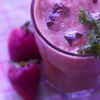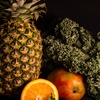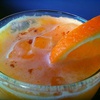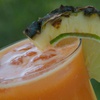Mangos are a delicious and refreshing fruit that can be used in juices. They have a sweet and tropical flavor that pairs well with a variety of other fruits and vegetables. When juicing mangos, it is important to remove the skin and seed before adding the fruit to the juicer. Mangos contain a lot of fiber, which can make the juice thick and pulpy. To achieve a smoother consistency, you can strain the juice through a fine-mesh sieve or blend it with water or another liquid. Mangos are a good source of vitamins and minerals, including vitamin C, potassium, and beta-carotene, which makes them a nutritious addition to any juice.
Prepping Mangos for Juicing
To prepare mangos for juicing, follow these steps:
- Wash the mango thoroughly under cold running water to remove any dirt or debris.
- Cut the mango into small chunks, removing the skin and seed as you go. It is easiest to cut the mango into slices and then remove the skin by running a knife between the skin and the flesh.
- Discard the skin and seed, and place the mango chunks into the juicer.
Why can't I juice the skin?
Mango skin is not typically used in juicing because it is tough and difficult to blend or juice. In addition, the skin of a mango can contain substances that may cause digestive issues when consumed in large amounts. For these reasons, it is best to remove the skin before juicing the mango.
Some people may experience an allergic reaction to the skin of a mango, which can cause itching or other symptoms. Mango skin allergy is relatively rare, but it can occur in people who are allergic to certain proteins found in the skin of the fruit.
Health Benefits of Mango Juice
Mango is a nutritious fruit that is high in vitamins and minerals, making it a healthy choice for juicing. Some potential health benefits of mango juice include:
- Boosting the immune system: Mango is a good source of vitamin C, which is important for maintaining a healthy immune system.
- Supporting heart health: Mango is rich in potassium, which can help to lower blood pressure and reduce the risk of heart disease.
- Promoting healthy digestion: Mango contains fiber, which can help to promote healthy digestion and prevent constipation.
- Supporting healthy skin: Mango is a good source of beta-carotene, which the body converts into vitamin A. Vitamin A is important for maintaining healthy skin, eyes, and immune function.
- Reducing inflammation: Mango contains antioxidants, which may help to reduce inflammation in the body and lower the risk of chronic diseases such as heart disease and cancer.
It is important to note that the potential health benefits of mango juice will depend on the overall quality of your diet and lifestyle. As with any food or beverage, it is important to consume mango juice in moderation as part of a balanced diet. Enjoy!
Interesting Mango Facts
- Mangos are native to South Asia and are believed to have been cultivated for over 4,000 years. Today, they are grown in tropical and subtropical regions around the world, including India, Brazil, Mexico, and the Philippines.
- Mangos are a member of the cashew family and are closely related to pistachios and poison ivy.
- Mangos are a good source of nutrients and are high in vitamins and minerals, including vitamin C, vitamin A, potassium, and beta-carotene.
- Mangos are often used in traditional medicine and are believed to have a number of health benefits, including improving digestion, boosting the immune system, and reducing inflammation.
- Mangos have a unique growth cycle, with some varieties taking up to three years to reach maturity. When ripe, the fruit can range in color from green to yellow, red, or orange.





